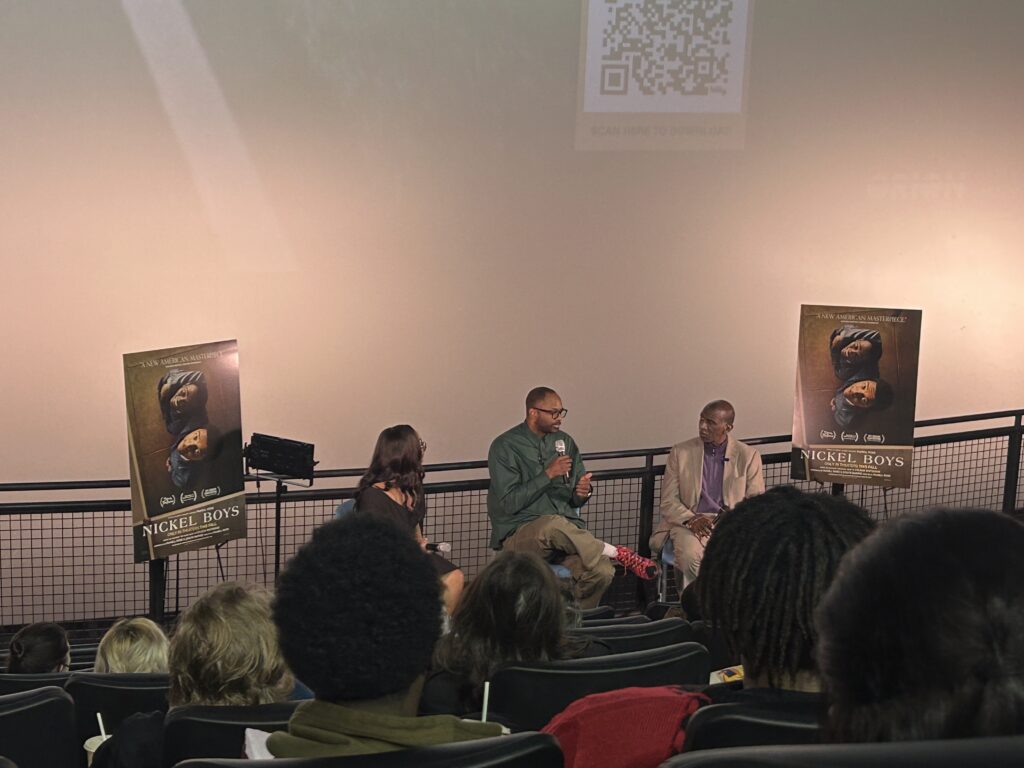On Thursday, January 16, Florida A&M University’s (FAMU) student-led campus radio station, WANM-FM 90.5 The Flava Station, hosted a screening of Nickel Boys at Tallahassee’s IMAX Challenger Learning Center. The event brought together students from FAMU, Florida State University (FSU) and beyond for an emotional exploration of systemic injustice and historical memory. The screening, based on Colson Whitehead’s Pulitzer Prize-winning novel, was followed by a live discussion with the film’s director, RaMell Ross.
The event felt especially urgent in the context of Florida’s ongoing restrictions on teaching African American history, raising the stakes for preserving these stories.
A Film That Confronts History
“The film is deeply about being black, but it’s deeply about being human,” Ross shared during the post-screening discussion. His unique point-of-view approach brings audiences into the intimate experiences of Elwood Curtis, the protagonist whose dreams of college are shattered when he is unjustly sent to Nickel Academy, a brutal reform school in the Jim Crow South.
Ross highlighted the responsibility of telling stories like these.
“We’re dealing with young black children whose lives were cut short, whose potential was unfulfilled,” Ross shared. “How do you give that story what’s maybe arguably missing from historical telling through cinema?” His words resonated deeply with attendees, emphasizing the necessity of preserving these narratives.
The film’s connection to the real-life Arthur G. Dozier School for Boys–a Florida reform school infamous for systemic abuse and racism–amplified its significance. Ross’s work ensured that this chapter of history is neither forgotten nor erased, despite growing political attempts to censor similar narratives.
Audience Reactions: Lessons for Today
For many attendees, the film’s emotional weight was transformative. “I felt mixed emotions because, for one, we’re not in that time now, but at the same time, we are still being affected by it,” said Ari Bates, a first-year Business Administration student from Chicago.
“It’s critical to know what happened in our past because if we don’t remember our past, it’s bound to repeat itself.”
FSU Film student Sophie Burns shared how the film’s raw depiction of systemic abuse left her breathless.
“It made me deeply saddened to know that this is something that you know is happening, but you don’t really recognize it until it’s kind of put in front of you,” Burns said. “It was the most human movie I’ve literally ever watched. Like I’ve never felt such raw emotion before.”
Darnell Walker-Jones, a second-year FAMU Broadcast Journalism student, emphasized the film’s relevance to the present.
“Films like these are 100% important in the time that we live in right now,” he said. “There’s a lot of book bannings and silencing of real stories and real trauma that happened to Black people…So, I feel with a story like this, it brings light to something that I’m sure a lot of people didn’t know was happening before they got into the theater.
The Power of Black Storytelling
The evening also indicated the importance of Black creators leading these narratives. “This is the kind of stuff that has to be talked about,” said Finn Music, an FSU Animation student. “We need more films like this from people who have personal experience with the history. These Black stories need to be told by Black people.”
For director RaMell Ross, creating Nickel Boys was more than just filmmaking–it was an act of cultural preservation.
“The process of making it is quite joyful, specifically when you’re fortunate enough to be myself, who’s a relatively young, black filmmaker given imagination space in a Pulitzer Prize-winning book…that’s not a thing that happens,” Ross said.
Ross reflected on the joy of working with a diverse production team.
“All of our production heads, aside from one, were also folks of color…and the collaborative energy and the joy of being able to do something meaningful almost undercuts the difficulty of making the content,” he explained.
He also spoke about his artistic vision for the film.
“The gesture of kind of giving life to the Dozier School boys by bringing the camera into the body and using it as an extension of one’s consciousness, as opposed to the sort of third person view–I think that gesture carried us through,” he explained.
Ross further rejected traditional industry labels, saying. “The categories of film are for the industry. They’re not for the makers.”
A Call to Remember
As students left the screening, many expressed a renewed sense of purpose. For Bates, the story was a sobering reminder.
“It’s bittersweet,” Bates reflected. “For a split second, it’s like you’re putting on their shoes…It could have been us. We just happened to be born in a different generation.”
In a political climate where Black history is increasingly censored, Nickel Boys stands as a reminder of the necessity of storytelling. By challenging audiences to confront uncomfortable truths, the film ensures the stories of the past remain relevant and inspire action for a more informed future.













